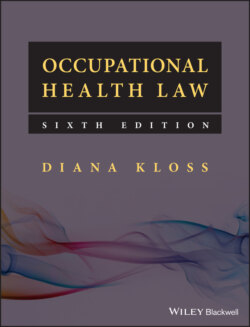Читать книгу Occupational Health Law - Diana Kloss - Страница 58
Clearance of infected HCWs to perform EPPs
ОглавлениеFor many years infection with HIV was a complete bar to working in any specialty that involved EPPs. However, the absence of evidence of transmission from HCW to patient in the UK, using data from patient notification exercises (PNEs) over 20 years during which over 10,000 patients were tested, and the development of effective anti‐retroviral therapy, led to a change of policy in 2014, allowing those HCWs whose condition is well controlled to perform EPPs. They must submit to regular viral load monitoring (every 12 weeks) by a consultant OH physician and consent to their names being registered on the UKAP‐OHR, a central confidential register managed by Public Health England on behalf of Health Protection Scotland, Public Health Wales and the Public Health Agency for Northern Ireland. HIV infected HCWs with a plasma viral load >200 copies/ml should be restricted from performing EPPs or commencing training for careers that rely upon performing EPPs.
HCWs who intend to perform EPPs should be tested for hepatitis B surface antigen first, which indicates current HBV infection. If negative they should be offered vaccination (unless already vaccinated) and have their response checked. If there is evidence that they may have acquired natural immunity, advice should be sought from a virologist or clinical microbiologist as to whether immunisation is necessary. HCWs for whom vaccination is contra‐indicated, who decline vaccination or who are non‐responders to vaccine, should be restricted from performing EPPs unless shown to be non‐infectious. They should be tested annually for surface antigen. HCWs shown to be hepatitis B e antigen positive will not be permitted to perform EPPs or undertake clinical duties in renal units. Treatment is available. An HB e antigen positive HCW who has been successfully treated and whose e antigen negative status is sustained 12 months after cessation of therapy, may be allowed to resume EPPs. Infected HCWs undergoing treatment must be regularly monitored. If they fail to attend for testing, or refuse to be tested, the occupational physician should warn the employer that they are no longer cleared to perform EPPs, until it has been established that the HCW has an up‐to‐date viral load which does not exceed the cut‐off of less than 200. In 2019 it was decided to include HCWs being monitored for HBV infection on the confidential register already set up for HIV positive HCWs.
HCWs infected with hepatitis C who are RNA positive should be restricted from performing EPPs or commencing training for careers that rely upon performing EPPs, unless they have responded successfully to treatment. If they have been treated with antiviral therapy and have remained HCV RNA negative for at least six calendar months after cessation of treatment, they can return to performing EPPs, but should be checked again six calendar months later.
Apart from these restrictions there is no bar to a HCW infected with a blood‐borne virus being employed in the care of patients which does not involve EPPs, but they should remain under regular medical and OH supervision in accordance with good practice.
